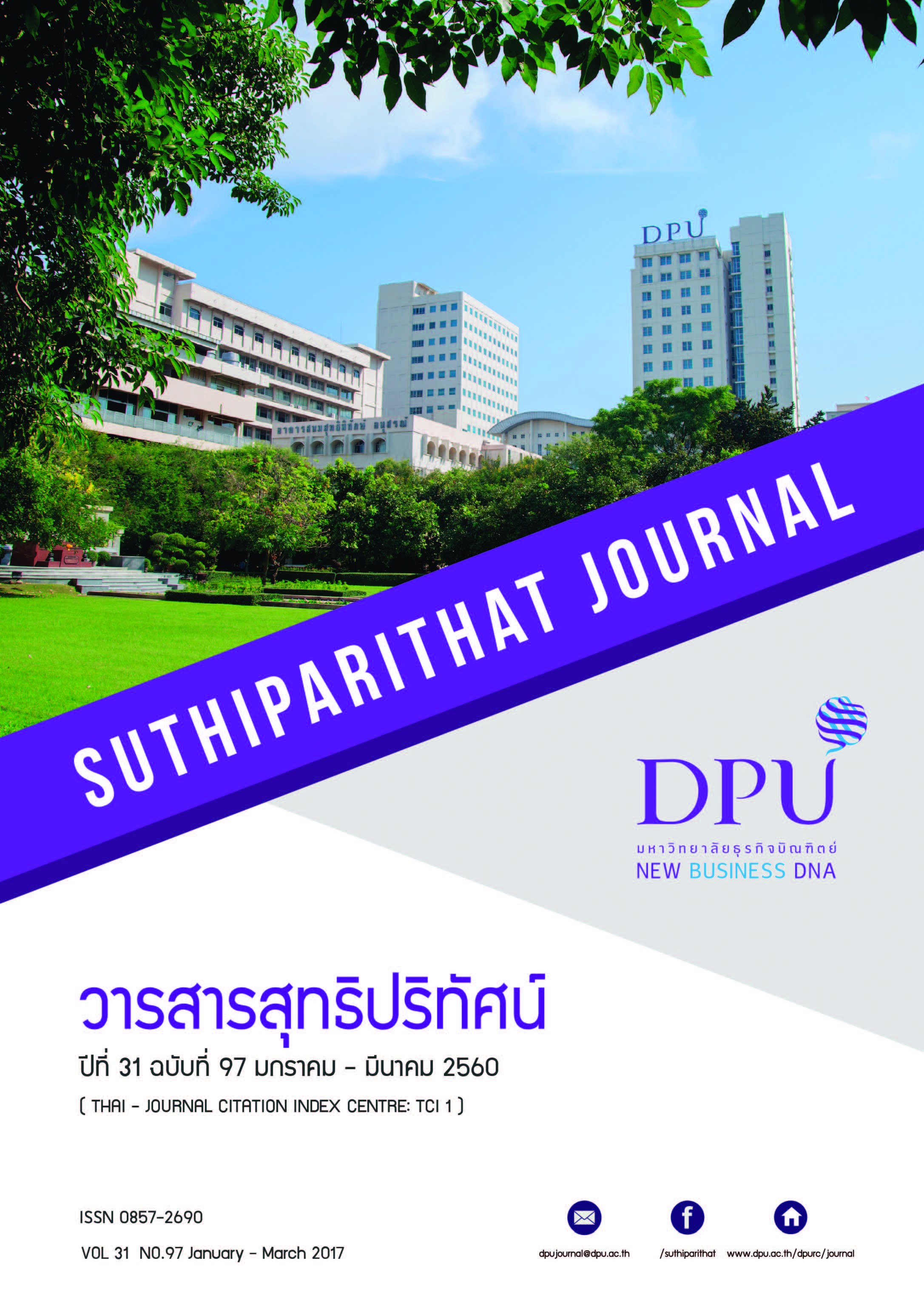ความรับผิดชอบต่อสิ่งแวดล้อมในท้องถิ่น: ภาระผูกพันของโรงแรมประเภทรีสอร์ท
คำสำคัญ:
การท่องเที่ยว, ความรับผิดชอบต่อสิ่งแวดล้อม, รีสอร์ท, ความรับผิดชอบต่อสังคม, สิ่งแวดล้อมของท้องถิ่นบทคัดย่อ
สิ่งแวดล้อมตามธรรมชาติในแหล่งท่องเที่ยวเป็นปัจจัยสำคัญยิ่งที่ดึงดูดนักท่องเที่ยวให้ไปเยือนงานธุรกิจรีสอร์ทจึงขึ้นอยู่กับสิ่งแวดล้อมตามธรรมชาติของท้องถิ่นค่อนข้างมาก เมื่อธุรกิจรีสอร์ท ได้รับประโยชน์จากทรัพยากรธรรมชาติของท้องถิ่น จึงควรร่วมรับผิดชอบ ขณะนี้ยังมีรีสอร์ทจำนวนหนึ่ง ยังไม่ตระหนักถึงความสำคัญของสิ่งแวดล้อมตามธรรมชาติที่มีต่อความสำเร็จและความยั่งยืนของธุรกิจ แม้ว่าธุรกิจรีสอร์ทจำนวนมากมีกิจกรรมที่แสดงความรับผิดชอบต่อสงิ่ แวดล้อมกำหนดอยู่ในนโยบายของ องค์กร แต่ส่วนใหญ่ยังเป็นไปเพื่อประโยชน์ในเชิงธุรกิจ เช่น การทำกิจกรรมการประหยัดพลังงานแล้ว นำมาทำการตลาด บทความนี้ประสงค์ที่จะชี้ให้เห็นความสำคัญของสิ่งแวดล้อมและทรัพยากรธรรมชาติ ของท้องถิ่น ที่รีสอร์ทนำมาใช้เพื่อการตลาดและการบริหารจัดการ ทั้งนี้เพื่อให้เกิดการตระหนักในภาระ ผูกพันที่รีสอร์ทควรร่วมรับผิดชอบต่อสิ่งแวดล้อมของท้องถิ่น อีกทั้งควรกำหนดเป็นประเด็นในนโยบาย ด้านความรับผิดชอบต่อสังคมขององค์กร
เอกสารอ้างอิง
Aguilo, E., Alegre, J., & Sard, M. (2005). The persistence of the sun and sand tourism model, Tourism Management, 26, 219-231.
Blanco, E., Rey-Maquieira, J., & Lozano, J. (2009). Economic incentives for tourism firms to undertake voluntary environmental management. Tourism Management, 30, 112-122.
Budeanu, A. (2005). Impacts and responsibilities for sustainable tourism: A tour operators’perspective. Journal of Cleaner Production, 13, 89-97.
Chubchuwong, M. (2014). Factors Affecting Visitors’ Pro-environment Attitudes and Behaviors: A Study of International Visitors in Thailand. Thailand; Asian Institute of Technology (AIT).
Chubchuwong, M., Beise-Zee, R., & Speece, M. (2015). The effect of nature-based tourism,destination attachment and ownership of property on visitors’ pro-environment attitudes and behaviours: a study in Thailand. Asia Pacific Journal of Tourism Research, 20(6), 656-679.
Chubchuwong, M., & Speece, M.W. (2016). The ‘people’ aspect of destination attachment in international tourism. Journal of Travel & Tourism Marketing, 33(3), 348-361.
Dodds, R., Graci, S.R., & Holmes, M. (2010). Does the tourist care? A comparison of tourists in
Koh Phi Phi, Thailand and Gili Trawangan, Indonesia. Journal of Sustainable Tourism,18(2), 207-222.
Dwyer, L., Edwards, D., Mistilis, N., Roman, C., & Scott, N. (2009). Destination and enterprise management for the tourism future. Tourism Management, 30, 63-74.
Encyclopaedia Britannica, Inc. (2016). Resort Hotel‘s Definition. Retrieved October 1, 2016, from https://www.britannica.com/technology/resort-hotel.
European Cities Marketing. (2011). Corporate Social Responsibility and Tourism. Retrieved on November 26, 2014 from https://www.europeancitiesmarketing.com/corporate-social-responsibility-and-tourism/p.1-5.
Falck, O., & Heblich, S. (2007). Corporate social responsibility: Doing well by doing good. Business Horizons, 50, 247-254.
Grobois, D. (2012). Corporate social responsibility reporting by the global hotel industry: Commitment, initiatives and performance. International Journal of Hospitality Management, 31, 896-905.
Imran, S., Alam, K., & Beaumont, N. (2014). Environmental orientations and environmental behaviours: Perceptions of protected area tourism stakeholders. Tourism Management, 40, 290-299.
Inoue, Y., & Lee, S. (2010). Effects of different dimension of corporate social responsibility on corporate financial performance in tourism-related industry. Tourism Management, 1-15.
Kotler, P., Bowen. J., & Markens, J. (2006). Marketing for Hospitality and Tourism. (4th Ed). Upper Saddle River, N.J.: Prentice Hall.
S. E. & Park, S. Y. (2011). An analysis of CSR activities in the lodging industry. Journal of Hospitality and Tourism Management, 18(1), 147-154.
Medlik, S. (1994). The Business of Hotel. (3rd ed). Oxford: Butterwort-Heinemann.
Miller, G. (2001). Corporate responsibility in the UK tourism industry. Tourism Management, 22, 589-598.
MOTS. (2014). Tourism Strategic Plan 2014-2017. Thailand: Ministry of Tourism and Sport.
National Statistical Office (2015). The 2014 Hotels and Guest Houses Survey. Bangkok: National Statistical Office.
Peng, X., Wei, J., & Li, Y. (2013). Corporate social responsibility practices in Chinese Hotel Industry: A content analysis of Public CSR information of 15 top Chinese Hotel-management Companies. Tourism Tribune, 28(3), 52-61.
Punitha, S., & Rasdi, R. M. (2013). Corporate social responsibility: adoption of green marketing by hotel industry. Asian Social Science, 9(17), 79-93.
Ritchie, J.R.B. & Crouch, G.I. (2003). The Competitive Destination: A sustainable tourism perspective. Oxon, U.K.: CABI Publishing.
Ryan, C. (2002). Equity, management, power sharing and sustainability-issues of the new tourism. Tourism Management, 23, 17-26.
Tourism Department. (2016). Thailand Tourist Statistics 2015. Retrieved November 10th, 2016, from http://www.tourism.go.th/home/details/
UNEP (1999). UNEP magazine for environmentally sustainable development, 10(3).
WTO (2000b). Global Code of Ethics for Tourism. Retrieved November 10th 2016, from https://www.world-tourismorg./project/ethics/principles.html.
Xotels (2016). Resort Hotel’s Definition. Retrieved October 1, 2016 from http://xotels.com/en/glossary/resort-hotel.
Yeoman, I. (2005). Tomorrow’s world-consumer and tourist. Visit Scotland, 1(2), 1-31.
Yuksel, A., Yuksel, F., & Bilim, Y. (2010). Destination attachment: Effects on customer satisfaction and cognitive, affective and conative loyalty. Tourism Management, 31, 274-284.
ดาวน์โหลด
เผยแพร่แล้ว
รูปแบบการอ้างอิง
ฉบับ
ประเภทบทความ
สัญญาอนุญาต
เนื้อหาและข้อมูลในบทความที่ลงตีพิมพ์ในวารสารสุทธิปริทัศน์ ถือเป็นข้อคิดเห็นและความรับผิดชอบของผู้เขียนบทความโดยตรงซึ่งกองบรรณาธิการวารสาร ไม่จำเป็นต้องเห็นด้วย หรือร่วมรับผิดชอบใด ๆ
บทความ ข้อมูล เนื้อหา รูปภาพ ฯลฯ ที่ได้รับการตีพิมพ์ในวารสารสุทธิปริทัศน์ ถือเป็นลิขสิทธิ์ของวารสารสุทธิปริทัศน์หากบุคคลหรือหน่วยงานใดต้องการนำทั้งหมดหรือส่วนหนึ่งส่วนใดไปเผยแพร่ต่อหรือเพื่อกระทำการใด ๆ จะต้องได้รับอนุญาตเป็นลายลักษณ์อักษรจากวารสารสุทธิปริทัศน์ก่อนเท่านั้น







